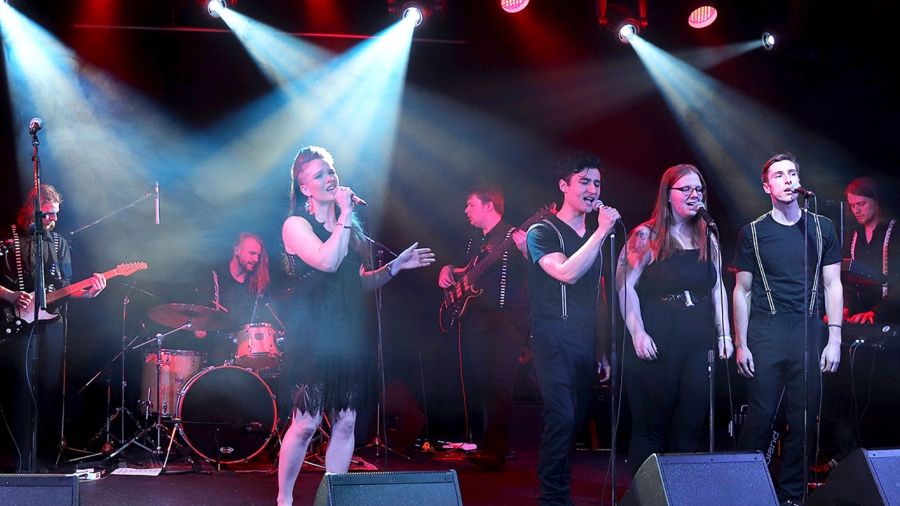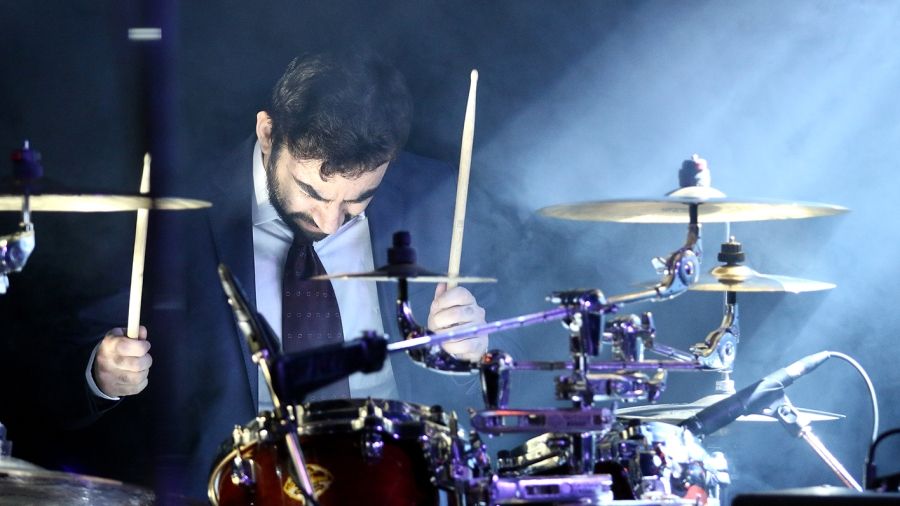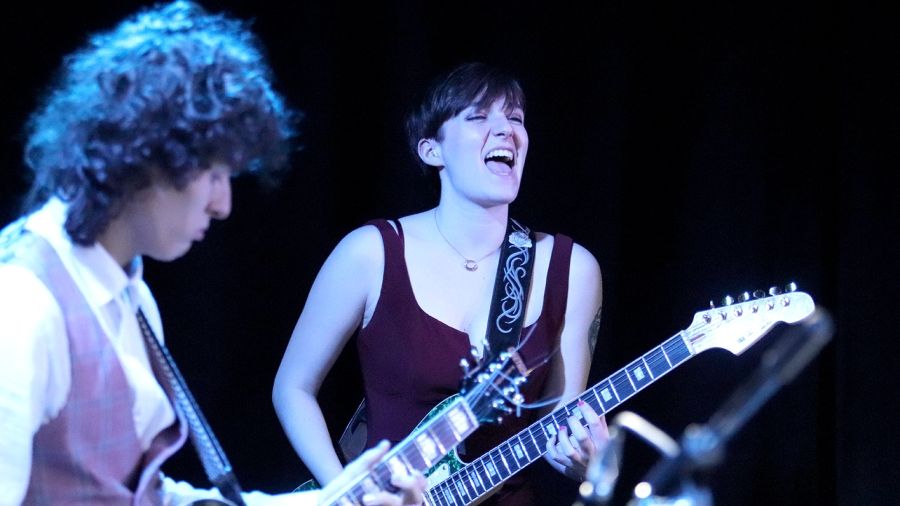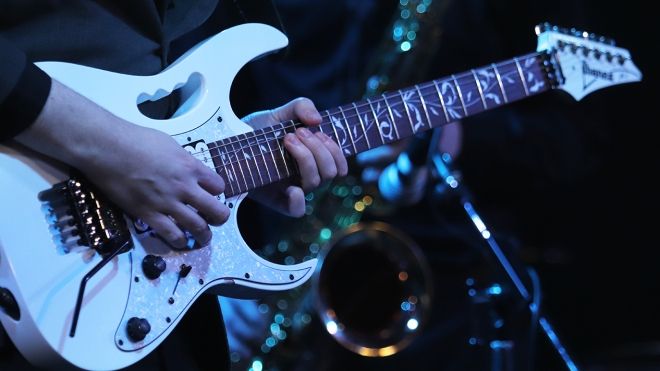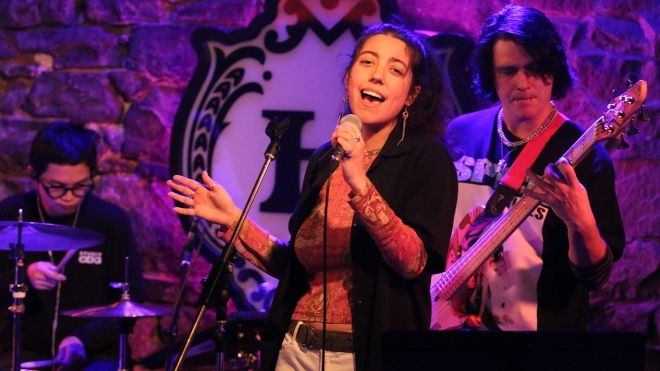Music and Technology, Contemporary - Production Diploma
Overview
The Production Diploma provides comprehensive practical training on current digital and analogue audio technology in a well-equipped, professional studio environment.
All relevant aspects of the production process are presented through the methodical study of contemporary production principles and practices. Core content includes microphone theory and use, studio recording techniques, mixing and editing strategies, distribution-ready mastering, live performance sound and session management.
Integration of class topics is supported by regular assignments that provide hands-on experience both in and out of the classroom. Demonstrations are designed to reflect application across a broad range of musical styles and traditions.
News
Program Outcomes
Upon successful completion of this program, students will be able to:
- Communicate effectively in various formats to a variety of stakeholders
- Apply entrepreneurial skills
- Apply developing problem-solving skills
- Outline the importance of professional and ethical behaviour
- Explain terms, concepts and practices relevant to the music industry
- Use music industry-related technology proficiently
- Function collaboratively in a modern music industry environment
- Demonstrate developing critical and creative thinking skills
Admission Requirements
In addition to meeting the general admission requirements to Selkirk College, applicants to the Contemporary Music and Technology Program must meet the following requirements to be considered fully qualified:
- Completion of Grade 12 or equivalent with a minimum of 60% or higher in English Studies 12
- Successfully pass an audition/interview that consists of:
- Assessment of instrumental ability on an instrument/voice. The instruments that are accepted are: guitar, bass, drums, keyboards, voice, saxophone, trumpet, banjo, mandolin and violin/fiddle.
- Demonstration of basic music theory proficiency equivalent to the Royal Conservatory Grade II, through a written examination that includes identifying intervals, key signatures and triads in basic music theory equivalent to Royal Conservatory of Music Grade II requirements.
- An ear training test for pitch, triads, rhythmic and melodic diction and interval recognition.
When it is not feasible to do the audition in person, alternate arrangements can be made. The theory and ear training test can be sent to the applicant for invigilation by an authorized person, and the performance portion can be submitted through approved audio/media material or by providing a link to an online video.
Special Exceptions
Applicants who perform an exceptional audition but who do not meet the theory and ear training standard will be required to attend a two-week theory preparation course in August. The applicant must have a minimum final grade of 75% in both the ear training and the theory sections to be accepted into the Music Program for September. Applicants who do not meet the minimum standard in matching pitch will not be accepted into the program.
Completed applications (except for the audition) are recommended to be submitted to the Registrar’s Office by April 30 prior to the start of the next intake of the program. Applications may be accepted after this date with permission of the school chair. The recommended deadline for completion of the audition process is May 31 prior to the commencement of the program.
Auditions will be arranged by the department when the completed application form and transcripts are received.
Study your instrument and related skills in the first year and choose a major in the second. An initial core year that provides solid grounding in music theory and ear training is followed by one of five program majors.
APPLICATION PROCESS
1. Before the applicant's file is considered to be complete, the following must be received:
a) completed application form;
b) official transcripts* of secondary school grades (an interim statement of grades is acceptable if the applicant is still attending secondary school);
c) official transcripts* of all other post-secondary education grades;
d) applicant information questionnaire; and
e) audition, theory, match pitch and ear training exam(s) results.
*Unofficial transcripts or photocopies will not be sufficient to complete the file.
2. Completed applications are recommended to be submitted to the Registrar’s office by April 30th Applications may be accepted after this date with permission of the school chair. The program has limited space available so preference will be given to those that apply early.
3. Recommended deadline for completion of the audition process (see point A.2 above) is May 31 prior to the commencement of the program.
4. Auditions will be arranged by the department when items B.1a) to B.1e) above are completed.
PART TIME STUDENTS
All full-time students in the Music Program must take, in each semester, all the "Music Core and Concentrate Courses" as applicable to the chosen major, as listed in section D: Graduation Requirements.
Students wishing to enrol in the Music Program on a part-time basis may do so providing the same entry requirements as full-time students as stated in section I.A have been fulfilled. Part-time students and full-time students not meeting the requirement of part C1 may attend classes only where space is available, after all full-time students are scheduled and permission from the course instructor has been obtained.
Students must achieve a cumulative GPA of 2.00 or higher with no grades below "C-". Specific majors have additional graduation requirements.
PROMOTION
1. In order to progress from one semester to the following, each semester must be completed with a term GPA of 2.0 (“C” average) or better, and no more than one “F.” Normally, students who do not meet this standard will be placed on Academic Probation the following term as per Policy 8619. Failure to meet this standard for two consecutive terms will result in a Required to Withdraw letter from the Dean.
2. In order to progress from Semester I to Semester II, students must maintain a GPA of 2.0 ("C" average) or better; To progress from Semester II to Semester III, students must maintain a GPA of 2.0 ("C" average) or better, plus any requirements for their chosen major. To progress from Semester III to Semester IV, students must maintain a GPA of 2.0 ("C" average) or better. Those students whose GPA is between 1.00 and 1.99 may continue as a General major.
3. Students who have an Incomplete grade ("I") at the end of any term may be allowed to proceed into the following term on a "conditional" basis. Such "conditional promotion" status will normally be permitted to continue only for the specified period permitted for the conversion of "I" grades (within 30 days). The "I" grade must be converted to meet the terms in B.1.
4. Due to the limited space available, a maximum of 10 students will be accepted into the Production major. In the event that more than 10 eligible students request acceptance into the Production major, the School Chair may increase capacity; otherwise, priority will be given to students with the highest GPA.
A. Prerequisites for Majors (Year 2)
For acceptance to majors in second year, students must have no ‘F’ grades, or have cleared previous ‘F’ grades in addition to the following major-specific requirements:
1. PRODUCTION: “B” or better in MUSC 161 Computer Applications to Music II.
DECLARING A MAJOR
The process to declare a major happens at the end of January for Music students who expect to complete the prerequisites listed in C above.
1. Students attend an info session at Music Forum class to learn about potential majors.
2. Review the required Music and Core Competency Courses specific to each major.
3. Complete an online Major Declaration Form listing the choice of major and preferred elective(s) by January 31.
GRADUATION (also see College Policy 8617 Graduation)
1. Credential:
Diploma in Contemporary Music and Technology with a specified major. Majors include: Performance, Production, Composition, Songwriting, and General Studies.
2. General Requirements:
Students must achieve a cumulative GPA of 2.0 or higher as per Policy 8617: Credentials and Graduation. Students who do not meet this standard will be required to repeat course(s) with a grade below “C” in order to raise the cumulative GPA.
3. Specific Requirements – Majors: Performance, Composition, Songwriting
a) To graduate as a Performance, Composition or Songwriting major, students must complete Year One course requirements as outlined in the tables below, all the requirements for their chosen major, and perform a Graduation Showcase.
b) Performance, Composition, and Songwriting majors who do not meet the specific graduation requirements for their major will not perform a Graduation Showcase. These students will graduate as a General Studies Major upon successful completion of the general graduation requirements and the coursework for a General Studies Major.
Graduation Showcase: Performance, Composition, and Songwriting majors must present a Graduation Showcase.
Courses
MUSC100A - Music Forum A
MUSC150 - Private Lesson I
MUSC 150 Private Lesson I. A weekly one-hour private instrumental or vocal lesson is provided for all first year students. Instruction is available on keyboard, woodwinds, saxophone, percussion, guitar, electric and acoustic, bass, and voice. Lessons are designed to increase students technical and musical abilities.
MUSC154 - Basic Keyboard I
MUSC 154 Basic Keyboard I. A required course for all students with the exception of keyboard majors. This course is designed to provide practical ''hands-on'' knowledge of the keyboard in today's music industry. Students will gain an understanding of chording (in nearest inversion) and will be required to create musical excerpts using upper structure triads.
Students who enter the program with piano as their principal instrument are exempt from taking MUSC 154/ MUSC 155 as part of the core course requirements for graduation.
MUSC158 - Ensemble I
MUSC 158 Ensemble I. Ensembles, required of all students, are the focal point of the Music program. All students are placed by audition in one or more ensembles. Students must participate in a minimum of four ensembles to graduate. Types of ensembles offered will focus on contemporary music including rock, funk, fusion, jazz and vocal, with the goal of developing both the student's repertoire and improvisational abilities. Students are encouraged to participate in as many different types of ensembles as possible. A graduation showcase will be required from all students majoring in Music Performance.
MUSC160 - Computer Applications to Music I
MUSC 160 Computer Applications to Music I. This course covers the fundamentals and practical applications of a digital audio system, as well as methods for functioning in an integrated MIDI/digital audio workstation (DAW) studio environment. An emphasis is put on musical projects designed to emulate professional practice and application. MIDI sequencing is done at computer-based workstations in the classroom. Fundamentals of digital audio recording are practiced and auxiliary buss send and return are introduced. Prior experience with Pro Tools or another DAW is not required.
MUSC162 - Instrumental Lab I
MUSC 162 Instrumental Lab I. This course is designed to help students develop instrumental skills. Grouped by instrument, students learn the fundamentals of reading, articulation, balance, dynamics, styles and technique as related to their particular instrument. This course is taught ''instrument-in-hand'' and also uses audio and visual aids to explore different techniques and styles. A requirement in all majors, students have weekly assignments.
MUSC165 - History Of Jazz
MUSC 165 History of Jazz. A survey of the music of the jazz idiom from its origins to the present. Included is a chronological study of important soloists, bands, vocalists, and composers. Classes will be partly lecture aided by video clips and partly analysis with intensive listening.
MUSC174 - Contemporary Harmony I
MUSC 174 Contemporary Harmony I. This course covers basic harmonic theory and common musical notation used in the music industry today. Topics include clefs, note recognition, key signatures, scales, intervals, triad and seventh chord construction, available tensions and basic harmonic functions. Upon successful completion of the course students will have a comprehensive and literate vocabulary of basic musical terms and symbols, and a working knowledge of basic harmonic functions.
MUSC180 - Ear Training I
MUSC 180 Ear Training I. This course is the first of a four-level program focusing on aural recognition of intervals, triads, seventh chords, rhythms, melodies, diatonic chord progressions and diatonic relative pitch. Students begin to learn the language of solfege and sight singing. This ear training class provides aural perception of the theory learned in MUSC 174, which is taught concurrently. Recorded examples, as well as live playing, are used for developing dictation skills.
MUSC100B - Music Forum B
MUSC151 - Private Lesson II
MUSC 151 Private Lesson II. A weekly one-hour private instrumental or vocal lesson is provided for all first year students. Instruction is available on keyboard, woodwinds, saxophone, percussion, guitar, electric and acoustic, bass, and voice. Lessons are designed to increase students technical and musical abilities.
MUSC155 - Basic Keyboard II
MUSC 155 Basic Keyboard II. A required course for all students, except Keyboard majors. This course continues to expand on chords and keyboard techniques. This semester also focuses on musical ''grooves'' of various styles requiring more challenging coordination and technical skills
Students who enter the program with piano as their principal instrument are exempt from taking MUSC 154/ MUSC 155 as part of the core course requirements for graduation.
MUSC159 - Ensemble II
MUSC 159 Ensemble II. Ensembles, required of all students, are the focal point of the Music program. All students are placed by audition in one or more ensembles. Students must participate in a minimum of four ensembles to graduate. Types of ensembles offered will focus on contemporary music including rock, funk, fusion, jazz and vocal, with the goal of developing both the student's repertoire and improvisational abilities. Students are encouraged to participate in as many different types of ensembles as possible. A graduation showcase will be required from all students majoring in Music Performance.
MUSC161 - Computer Applications to Music II
MUSC 161 Computer Applications to Music II. This course develops the student's ability to produce his or her own multi track recordings with Pro-tools digital audio workstation. Fundamentals of auxiliary buss, application of plug-in inserts such as EQ, compression, noise gate, delay, and reverb are applied. Principals of analogue and sample synthesis are applied to the development of projects. Fundamentals of microphone theory and application are introduced. Notation software is introduced and well as workstation components and application.
MUSC163 - Instrumental Lab II
MUSC 163 Instrumental Lab II. This course is designed to help students develop instrumental skills. Grouped by instrument, students learn the fundamentals of reading, articulation, balance, dynamics, styles and technique as related to their particular instrument. This course is taught ''instrument-in-hand'' and also uses audio and visual aids to explore different techniques and styles. A requirement in all majors, students have weekly assignments.
MUSC164 - History Of Rock
MUSC 164 History of Rock. A study of the evolution of rock music from its origins to the present. Classes will focus on musical characteristics of the different styles within the genre. Sociological, geographical, literary and other cultural aspects will be discussed. Both audio and video clips will be presented for in-class analysis.
MUSC170 - Arranging I
MUSC 170 Arranging I. An introductory course in commercial arranging dealing primarily with the rhythm section. Specific topics will include ranges of instruments, arranging from lead sheets, planning an arrangement as well as detailed analysis of the function and common practice notational systems for the electric bass, guitar, piano, and drums. This course is designed to give students a working understanding of the techniques of writing for the rhythm section, which is essential to arranging all types of popular music. This semester will taper into midi and function as a companion to that course. All assignments will be handwritten. Special attention will be payed to notational considerations.
MUSC175 - Contemporary Harmony II
MUSC 175 Contemporary Harmony II. This course covers harmonic functions currently in use in all styles of popular music. Extensive use of recorded and written examples are used to show the harmony/melody relationships. Basic harmonic analysis as a tool is presented with an introduction to secondary dominant chords, extended dominant chords, modal interchange chords, and basic minor key and blues concepts. In addition, the application of melodic minor and harmonic minor are applied to these chords. Students are required to demonstrate through written projects, the current uses of these basic contemporary harmonic concepts.
MUSC181 - Ear Training II
MUSC 181 Ear Training II. A continuation of the skills learned in MUSC 180. The focus is on harmonically based melodies with larger intervallic skips. Rhythms are explored primarily through syncopated eighth notes, triplets and sixteenth notes. This ear training class provides an aural perception of MUSC 175, which is taught concurrently.
MUSC100C - Music Forum C
MUSC252 - Private Lesson III A - Non Performance Major
MUSC 252 Private Lesson III A. A weekly half-hour private instrumental or vocal lesson is provided for all Music Production, Composition, and General Music majors. Instruction is available on keyboard, woodwinds, saxophone, percussion, guitar, electric and acoustic bass, and voice. Lessons are designed to increase students' technical and musical abilities.
MUSC258 - Ensemble III
MUSC 258 Ensemble III. Ensembles, required of all students, are the focal point of the Music program. All students are placed by audition in one or more ensembles. Students must participate in a minimum of four ensembles to graduate. Types of ensembles offered will focus on contemporary music including rock, funk, fusion, jazz and vocal, with the goal of developing both the student's repertoire and improvisational abilities. Students are encouraged to participate in as many different types of ensembles as possible. A graduation showcase will be required from all students majoring in Music Performance.
MUSC264 - Instrumental Lab III
MUSC 264 Instrumental Lab III. This course is designed to help students develop instrumental skills. Grouped by instrument, students learn the fundamentals of reading, articulation, balance, dynamics, styles and technique as related to their particular instrument. This course is taught ''instrument-in-hand'' and also uses audio and visual aids to explore different techniques and styles. A requirement in all majors, students have weekly assignments.
MUSC290 - The Business of Music
MUSC 290 The Business of Music. The purpose of this course is three-fold: to provide the student with an awareness of the career possibilities in the field of music; to introduce students to some of the major aspects of the music profession; and to introduce students to basic general business practices. This course is of particular benefit to students planning a career in the music industry.
MUSC260 - Mixdown and Editing I
MUSC 260 Mixdown and Editing I. In this course the functional, financial, and legal aspects of production entrepreneurship is examined. Topics covered include technical and artistic preparation through pre- and post- production, recognition of standard recording techniques, the effects of signal processing, and the analysis of various production styles in rock, pop, jazz and classical recordings. Student producers work with student engineers and artists to meet course requirements for two-track and multi-track recording projects.
MUSC270 - Recording Techniques I
MUSC 270 Recording Techniques I provides students with an introduction to recording principles and practices. Through theoretical and practical instruction students will acquire a basic understanding of studio technologies and recording skills. Topics include fundamentals of analogue and digital recording, design and function of microphones, loudspeakers, and acoustical considerations in sound recording. Student engineers work with student artists to complete live-to-two track and multi-track recordings.
MUSC280 - Ear Training III
MUSC 280 Ear Training III. This course continues to develop an aural perception of intervals, pitches, seventh chords, chord progressions, melodies and rhythms. The focus of this semester is on minor and secondary dominant melodies and chord progressions and 9th chords. The rhythms explore sixteenth note syncopated rhythms as well as cut time, 3/8, 6/8 and 5/4 meters
MUSC288 - Advanced MIDI Applications I
MUSC 288 Advanced MIDI Applications I. This course is an applied study of the software and concepts used in the recording home studio environment. The primary focus of the course is in the use of Pro Tools LE for the self-recording musician. Topics include: mixing console application, editing techniques, microphone technique, an introduction to effects processing for final mixing, auxiliary buss in the virtual mixing board, use of patch bay, outboard effects, and file maintenance.
MUSC235 - Production Studio Management I
MUSC 235 Production Studio Management I provides an examination of methods designed to facilitate the successful management of studio recording projects. The course will cover session set-ups, use of templates for album recording, tracking and take sheets, archiving and final delivery. It will also explore professional session protocol and strategies for cultivating excellent relationships with clients. Students will learn to implement these topics across a range of real world situations.
MUSC245 - Live Sound Production I
MUSC 245 Live Sound Production I provides an introduction to the theory and practice of PA and sound reinforcement. Students will explore the fundamentals of live sound systems (portable and in-house), monitors, microphone techniques, live mixing and concert recording (stereo and multi-track). Also covered are best practices for sound checking, eliminating feedback, troubleshooting and file management.
MUSC268 - Songwriting I
MUSC 268 Songwriting I. This course is designed to help you prepare for survival in the competitive world of the songwriter's market. Learn about all types of styles while striving to define your own. Special attention is paid to the rudiments of songwriting: creativity, basic theory (usage of basic rhythms, scales, harmony, melodic patterns, lyrics, etc.), basic styles (pop, rock, folk, country, etc.), production patterns, and the legalities of the music business. The class also spends time analyzing the work of other writes (successful and unsuccessful; those who have maintained artistic integrity; those who have not).
MUSC274 - Contemporary Harmony III
MUSC 274 Contemporary Harmony III. This course continues with the principles of contemporary harmony in Harmony 2. Topics are expanded to include Deceptive Resolution, Substitute Dominants, Diminished Chords, Modulation, Blues and Chord Scale Relationships. This course provides students with a practical working knowledge of harmony in various styles of contemporary music as it applies to composition and improvisation.
MUSC282 - Film Scoring I
MUSC 282 Film Scoring I. This hands-on course focuses on TV and radio broadcasting. Students are required to score themes and cues for various TV and radio shows using mostly electronic equipment along with one or two live musicians.
MUSC162 - Instrumental Lab I
MUSC 162 Instrumental Lab I. This course is designed to help students develop instrumental skills. Grouped by instrument, students learn the fundamentals of reading, articulation, balance, dynamics, styles and technique as related to their particular instrument. This course is taught ''instrument-in-hand'' and also uses audio and visual aids to explore different techniques and styles. A requirement in all majors, students have weekly assignments.
MUSC100D - Music Forum D
MUSC253 - Private Lesson IV A
MUSC 253 Private Lesson IV A. A weekly one-hour private instrumental or vocal lesson is provided for all first year students. Instruction is available on keyboard, woodwinds, saxophone, percussion, guitar, electric and acoustic, bass, and voice. Lessons are designed to increase students' technical and musical abilities.
MUSC259 - Ensemble IV
MUSC 259 Ensemble IV, required of all students, are the focal point of the Music program. All students are placed by audition in one or more ensembles. Students must participate in a minimum of four ensembles to graduate. Types of ensembles offered will focus on contemporary music including rock, funk, fusion, jazz and vocal, with the goal of developing both the student's repertoire and improvisational abilities. Students are encouraged to participate in as many different types of ensembles as possible. A graduation showcase will be required from all students majoring in Music Performance.
MUSC265 - Instrumental Lab IV
MUSC 265 Instrumental Lab IV. This course is designed to help students develop instrumental skills. Grouped by instrument, students learn the fundamentals of reading, articulation, balance, dynamics, styles and technique as related to their particular instrument. This course is taught ''instrument-in-hand'' and also uses audio and visual aids to explore different techniques and styles. A requirement in all majors, students have weekly assignments.
MUSC261 - Mixdown and Editing II
MUSC 161 Mixdown and Editing II. In this course the production aspects of recording music for various industry applications will be analyzed, discussed, and applied to student projects. Particular attention will be paid to the areas of music production for records, film and television, and radio and television commercials. Students will work with state-of-the-art video/audio synchronization devices. Student producers will work as a team with student engineers and artists, songwriters, and film composers to produce three projects; one in each idiom.
MUSC271 - Recording Techniques II
MUSC 271 Recording Techniques II. The emphasis in this course is on advanced multi-track recording techniques including microphone placement, console signal flow, and live recording. Topics include: discussion and utilization of signal processing equipment including limiters, compressors, noise gates, digital reverb, and delay. Student engineers work with student producers and artists or composers. Prerequisites: MUSC 270 for MUSC 271. Must be taken concurrently with MUSC 261/289.
MUSC281 - Ear Training IV
MUSC 281 Ear Training IV. Upon successful completion of this course you have will have mastered basic aural skills for professional musicianship. The emphasis on this level is chromatic and modal melodies. Mixed meters and odd time signatures are explored. Emphasis is given to transcribing pre-recorded songs.
MUSC289 - Advanced MIDI Applications II
MUSC 289 Advanced MIDI Applications II. This course is a continuation of MUSC 288. The primary focus is the advanced use of Pro Tools LE. Topics will include: the musical application of effects plug-ins, computer components and related technology, and other recording formats.
MUSC236 - Production Studio Management II
MUSC 236 Production Studio Management II provides an examination of an expanded range of recording management tools and techniques that include budgets and estimates, contracts, scheduling, billing and delivery for CD, film, video, web and multi-media. Students will assist in and run a number of real-world studio sessions including full band live-from-the-floor, single instrument overdubbing, mixing and mastering.
MUSC246 - Live Sound Production II
MUSC 246 Live Sound Production II is a second-level exploration, where students deepen their understanding of the many aspects that constitute live sound production including effects processing, advanced file management and custom set-ups that involve multi-media, in-ear monitors and click tracks. Each student's final project will be to develop and run front-of-house and back-of-house sound for at least two showcase concerts.
MUSC163 - Instrumental Lab II
MUSC 163 Instrumental Lab II. This course is designed to help students develop instrumental skills. Grouped by instrument, students learn the fundamentals of reading, articulation, balance, dynamics, styles and technique as related to their particular instrument. This course is taught ''instrument-in-hand'' and also uses audio and visual aids to explore different techniques and styles. A requirement in all majors, students have weekly assignments.
MUSC269 - Songwriting II
MUSC 269 Songwriting II. This course is designed to strengthen your songwriting skills in every respect. Closer attention is paid to marketing skills, legal procedures, finding one's personal niche in the music business (whether to focus on one's own style, concentrate on writing tunes for other acts, or both; whether to go through a publisher or be your own publisher; etc.). Co-writing music is to be explored (you put lyrics to someone else's music; they put music to yours). Class time centers around the analysis of successful songwriters in every genre.
MUSC275 - Contemporary Harmony IV
MUSC 275 Contemporary Harmony IV. This course continues with the principles of contemporary harmony in Harmony 3. Topics are expanded to include further concepts of Deceptive Resolution, Non-functional Dominant chords, Contiguous Dominants, Pedal Point and Ostinato, Modal harmony, Compound Chords, and Constant Structures. This course provides students with a practical working knowledge of harmony in various styles of contemporary music as it applies to areas of composition and improvisation.
MUSC283 - Film Scoring II
MUSC 283 Film Scoring II provides students with an understanding of the different compositional techniques used in feature film genres such as drama, suspense, comedy and action/adventure. The course content includes analysis of film soundtracks of the past and present, the business of being a film composer, film scoring technology, orchestration, conducting, and how to get started as a film composer.
MUSC291 - Fundamentals of Private Studio Teaching
This course, MUSC 291 Fundamentals of Private Studio Teaching, studies aspects of effective private studio teaching. Topics covered, but not limited to, include: pedagogy, literature, technology, business plans, methods and materials to support a teacher’s attributes and philosophies essential to the successful private instructor.
Tuition & Fees
All amounts are estimates and are subject to change. Tuition amounts are based on a full-time course load. Please note that many programs have additional costs beyond those listed here. For more information, please visit Tuition & Fees. For Year 1 tuition and fees, see Contemporary Music & Technology.
Find Out More
We look forward to connecting with you! Fill out this form and we'll reach out to you.

